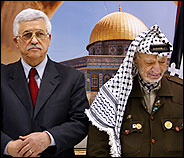| Prime Minister Ariel Sharon of Israel
has spoken of "painful concessions," but he wants to hold onto settlements
and to permit a Palestinian state in less than half the West Bank.
Administration officials said today that
their priority would be to avoid further discussions of the plan and to
concentrate instead on steps that could be taken on the ground.
"There have to be some steps by the Palestinians
and some reciprocation by the Israelis if we are going to restore trust
and dialogue on both sides," said an administration official. "We haven't
got much time."
When he visits Israel in the second week
of May, Secretary of State Colin L. Powell is expected to press the Palestinians
to disarm militant groups. He will also try to persuade the Israelis to
ease the hardships of Palestinians living under military occupation in
the West Bank and Gaza.
These are precisely the steps that the
Bush administration has tried to orchestrate before, without success. But
three things are different now, American officials say.
First, and most obvious, is rewriting
the political landscape in the Middle East, now that American and British
troops have crushed Saddam Hussein, Israel's enemy. Americans believe that
the victory gives Mr. Bush new leverage throughout the region.
Second is the strategy of the "road
map." Drafted by the United States in concert with the European Union,
Russia and the United Nations, the plan theoretically presents a united
front to prevent the Palestinians, who have closer ties to the other partners,
from playing one party against the other.
The third factor lies in the relationship
that Mr. Bush now has with Arab countries, which have beseeched him for
more than a year to get involved in Middle East peace negotiations. These
pleas became more insistent and anguished as the idea of war with Iraq
gathered speed over the last six months.
Now administration aides say Mr. Bush is
planning to approach these Arab nations. Washington wants Arab leaders
to persuade the new Palestinian government to stop supporting militant
groups that carry out attacks on Israeli civilians and make it impossible
for Israel to make the concessions needed to get the talks going.
Secretary Powell is due to stop in Syria
and then Lebanon this week for some candid talk with President Bashar al-Assad.
Later in the month he will travel to other Arab countries and to Israel,
and will meet with the new Palestinian prime minister, Mahmoud Abbas.
Syria has been warned that it might be
the next focus of American pressure after Iraq. Then the administration
shifted gears to say that Syria had been cooperating on searching for Iraqi
leaders who may have escaped there.
There is a strain of thinking in the administration,
and among some experts, that Syria could return to its promising role as
a partner in an agreement with Israel, as seemed possible in the 1990's.
Indeed today Mr. Powell told a Senate appropriations subcommittee on foreign
affairs that he thought Mr. Assad "wants to be a part of that comprehensive
solution" in the Middle East.
But no less tough will be the other part
of Mr. Powell's Arab diplomacy, with the three Arab countries he is to
visit later in the month: Saudi Arabia, Jordan and Egypt.
Since the Arab League supports the Palestinian
Authority with hundreds of millions of dollars in subsidies each year,
the administration reasons that the leverage of funding might persuade
the Palestinians to renounce attacks on Israeli civilians for the good
of progress toward a Palestinian state.
But while Mr. Bush has said repeatedly
that no progress can occur without a decline, or even an end, to terrorist
attacks on Israelis, administration officials acknowledge that no progress
can be made without Israel taking steps to build up Mr. Abbas as an alternative
to Yasir Arafat.
A year ago, Mr. Powell met with Mr. Arafat
in Ramallah while he was surrounded by Israeli forces attacking his headquarters.
It was a low moment in American diplomacy, American officials now agree.
It led to Mr. Bush's demand that the Palestinians find a new leader.
Mr. Bush hailed both the publication of
the peace plan and the selection of Mr. Abbas today, declaring him "a man
I can work with." He also called on Israelis, Palestinians, and especially
Arab nations in the region to take their own steps to reach that agreement.
Many conservative groups have criticized
both the plan and the philosophy behind it. The most prominent, perhaps,
was Representative Tom DeLay, the House majority leader, who called it
dangerous to Israel.
A final choice for Mr. Bush is whether
to select a presidential envoy to press the Middle East peace negotiations.
On one hand, such a move would demonstrate to the region that he is committed
to bringing about a settlement.
But on the other hand, Mr. Bush has openly
criticized his predecessor, Bill Clinton, for precisely such involvement
and may not want to leave himself vulnerable to the same criticism if the
negotiations falter. Administration officials say that the decision is
not likely to be made until Mr. Powell returns from the Middle East in
mid-May.
Whatever the results of his trip, the issue
is not likely to be one Mr. Bush can avoid. There are too many people demanding
that he remain involved, whatever the political risk.

|
